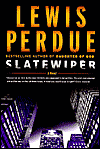You are cordially invited to attend the unveiling of General Clark Braxton’s release of
Castello Da Vinci’s Xantaeus.
This first ever Xantaeus, Cabernet Sauvignon (produced to his demanding palate by Cline Cellars) will be released to the general public on the evening of Wednesday, December 14th, 2005.
It's not unusual for to have a character sipping one of the novelist's favorite vintages. But what's never been done (before Xantaeus) is for the wine to start in the book and end up in a bottle.What's more, General Braxton (Chairman of
Defense Therapeutics) is featured as a major character in my new thriller,
Perfect Killer.
The event will be held from 1700-1930 in the Barrel Room at Cline Cellars, 24737 HWY 121, Sonoma.
RSVP by December 2, 2005; 707.940.4082.
Light hors d’oeuvres and Castello Da Vinci Xantaeus 2003 will be served.
Please download and print out the
official invitation and present it at the door.
A map of the event location may be found
here.
How the Castello Da Vinci Brand Came To BeMy newest investigative thriller, Perfect Killer, is as much fact as it is fiction.
Perhaps more fact than fiction as evidenced by
- the
Freedom of Information Act documents,
- the
bibliography,
- Col. Gabriel's
Afterword,
- the
Virtual Tour and
- especially by the real people in the book. I interviewed many people including General Clark Braxton (U.S. Army, Retired)
One afternoon, following one of the many sessions with Gen. Braxton at
Castello Da Vinci, he took me on a tour of his remarkable wine cellar carved out of his estate's the volcanic knoll overlooking the Napa Valley. We tasted one of the rare bottles of his own privately vinted wine.
General Braxton mentioned that he had many demands for his wine, many more than he could possibly fulfill. Besides, he stressed, the government regulations, permits and bureaucratic torture associated with selling wine to the general public was more than he wanted to deal with. "I will not be held hostage by some power-hungry bureaucrat," were his exact words.
Over the next several months, we talked about this and I suggested that perhaps we could find a fine vintner willing to make a limited amount of specially made wine for retail sales.
That led me to Cline Cellars. I've known Fred and Nancy Cline for years. Their children go to school with mine. And significantly -- my wife and I have probably consumed more Cline Cellars wine than any other single winery in the world.
The current release of Xantaeus Red 2003 is the joint venture that resulted. While most wineries and wine brands start with a fantasy of some sort, the Castello Da Vinci, Xantaeus 2003 is the first to make the transition from fiction to fact.
Cline Cellars, General Braxton and I are all partners in this new venture which we hope will bring you great pleasure, sipped thoughtfully as you read your copy of Perfect Killer.


